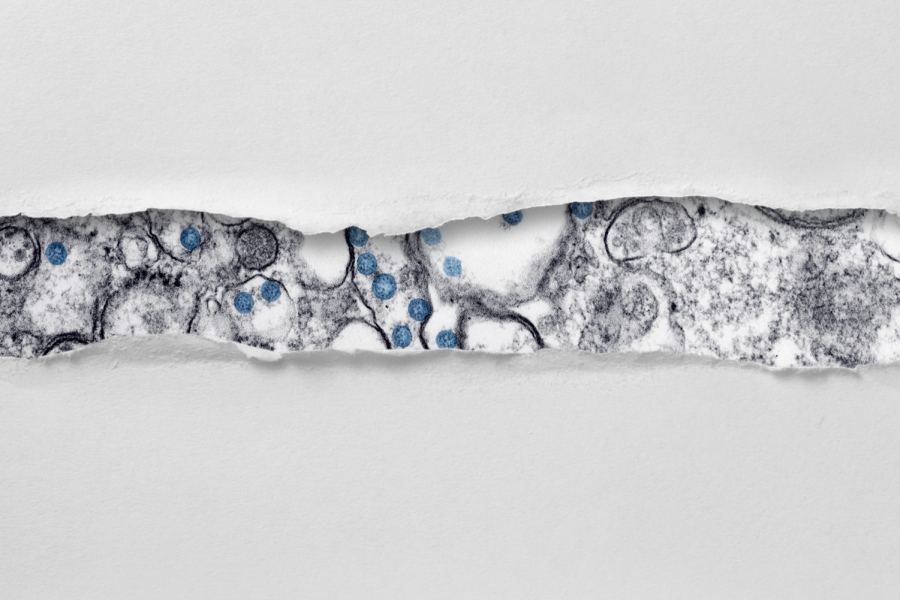Transmission electron microscopic image of an isolate from the first U.S. case of COVID-19, according to the Centers for Disease Control.
NKU employee, spouse self-quarantining with flu-like symptoms
Spouse not tested for COVID-19, wasn’t deemed high risk by NKY Health Department
March 13, 2020
In a campus-wide email, President Ashish Vaidya said that an NKU employee is self-quarantining with flu-like symptoms.
According to the email, the employee’s spouse was also sick but tested negative for strep and flu at a clinic. The spouse was then referred to contact the Northern Kentucky Health Department for COVID-19 testing but wasn’t deemed a high enough risk to warrant testing.
Vaidya said in the email that the employee and spouse are following the Centers for Disease Control’s direction to self-quarantine for 14 days.
The name and position of the employee have not been announced at this time.
Vaidya added that testing for COVID-19 is being routed through health departments, sharing the process to follow if you need to get tested, as seen below:
The Kentucky Department of Health
If you have developed a fever or respiratory symptoms and believe you have had exposure to a known case or traveled to an area with community spread, you should:
- Isolate yourself from others in your home and contact your local health department to describe your symptoms and any recent travel before you go to the healthcare facility.
- If you want advice about your illness, call the hotline at (800) 722-5725.
- If you are sick and feel you have an emergency, please call your doctor and seek medical care.
Ohio Department of Health strongly recommends that all Ohioans immediately take the following actions if they feel sick:
- Call your doctor immediately (before seeking care) if you feel like you are developing fever, cough, and shortness of breath. If you have a medical appointment, call the healthcare provider and tell them that you have symptoms consistent with COVID-19. Put on a facemask before you enter the facility.
- Seek prompt medical attention if you develop emergency warning signs for COVID-19. In adults, these can include:
- Difficulty breathing or shortness of breath
- Persistent pain or pressure in chest
- New confusion or inability to arouse
- Bluish lips or face.
- Have severe, acute lower respiratory illness requiring hospitalization and no other diagnosis to explain the symptoms.
- For answers to your COVID-19 questions, call 1-833-4ASKODH (1-833-427-5634)
Vaidya also said if you’re returning from any travel outside of the United States, you are required to self-quarantine for 14 days and monitor your health, as the latest Global Health Advisory moves all countries to a Level 3.
“As this situation evolves, we know it will impact our campus. We ask that you notify your supervisor and Human Resources if you are staying home with flu-like symptoms, if you are getting tested for COVID-19, if you have come in contact with someone who has tested positive for COVID-19, or you have been required to self-quarantine,” Vaidya said in the email. “This ensures we know how our campus community is being affected by the virus.”
The Northern Kentucky Health Department has these recommendations if you are sick:
- Keep in mind this is a virus and treat the illness as you would with any other virus, like the flu. If you have runny nose, cough, fever or other common respiratory infection symptoms, take Tylenol- or Motrin-like products and stay home until you are fever-free for 24 hours.
- If you think you need medical care, call your healthcare provider for their instruction before leaving home.
- NKU’s Health Services has set up a telephone triage for those who are sick and need a consultation. Please call 859-572-5650.
- Visit an emergency department if you believe you have an emergency. The Kentucky Health Department recommends people only go to the emergency room for an illness that would have taken you to the hospital BEFORE COVID-19.
- All other questions about COVID-19 can be directed to the Kentucky Department of Health hotline at 1-800-722-5725.
The University recommends following these precautions to help prevent the spread of viruses:
- Wash your hands often with soap and water for at least 20 seconds, especially:
- Before, during and after you prepare food,
- Before you eat and after you use the bathroom,
- After handling cash,
- More frequently when someone in your home is sick.
- Use an alcohol-based hand sanitizer if soap and water are not available.
- Frequently clean doorknobs, light switches, phones and other items commonly touched with disinfectant wipes.
- Avoid contact with people who are obviously sick.
- Cover your cough or sneeze with a tissue and then discard it in the trash.
With spring break travel this week, stay up-to-date with the latest travel information from the CDC.
The Northerner is currently investigating the impact of the switch to online learning, including but not limited to how housing, dining, student workers, labs, studios and the office of Health, Counseling and Student Wellness will be affected. For any questions you’d like to know about the decision, contact us anytime on Twitter or Instagram. For questions or concerns about how the virus could potentially affect campus, contact us at northerneredits@gmail.com or email the University at covid19@nku.edu. Keep checking The Northerner for all updates on NKU’s switch to alternative instruction.

